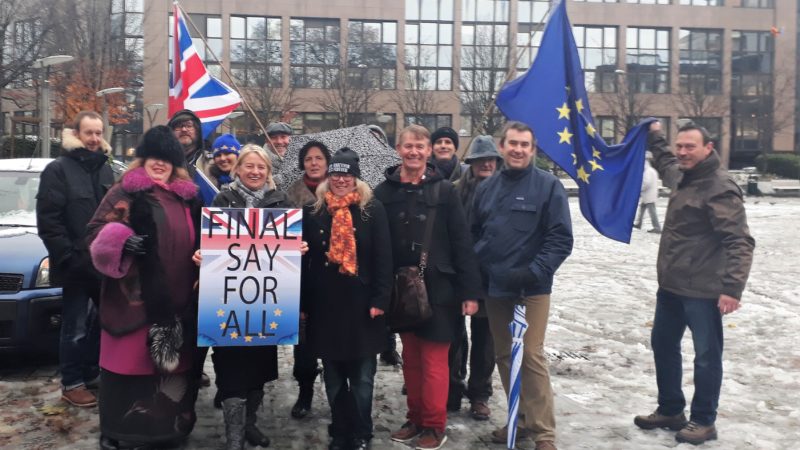The voice of UK citizens living in Europe is being totally ignored. But they're getting organised, writes Natalie Bennett.

For many British citizens, the Brexit debate is deeply personal: their lives are being ‘negotiated’.
When it comes to talk about our departure from the EU, there’s been a lot of discussion about the economics, about the multiple practical complications, about the immense political confusion in the UK government.
What’s got a lot less coverage is the human side – the British people who’ve been left in limbo, uncertain, fearful, unable to plan for their own and their families’ future and (rightfully) not trusting their own government to look out for their interests – the estimated 1.2 million Britons living in other parts of the European Union.
I stood with some of them this week, in deep snow and slush in Brussels, in a protest calling for a “Fair Say For All”. These citizens want a ratification referendum when the Brexit deal is done – one which includes the option of stopping Brexit. And crucially they were saying that all of their number – British citizens in the EU who will be deeply personally affected by the decision – must have a vote, and use it.
In the 2016 vote, only around 200,000 of them cast their vote. Many were excluded by having been outside the UK for more than 15 years, while others were put off by the difficulty of securing a vote.
At the same time as this action in Brussels, a parallel protest was happening outside Parliament in London. This was a truly European demonstration.
Nicola James, one of the organisers of the Brussels protest has lived for 25 years in German and the Netherlands. She says “I’m not part of the liberal elite.”
She told me:
“Why should the way that I live my life be up for negotiation? I had no vote in the referendum. This is not democracy.”
Chris Kendall, another of the organisers (and a citizen of “Remainia”, as he describes himself) said: “I’m British and I’m German. I’m a Londoner and a European. They have no right to take away our identities.”
Another speaker said: “It is the poorest and most vulnerable who will suffer most” from Brexit. Those with plenty of money will always find a way to move to and live where they want – inequality will only grow.
The Guardian is one of the few media outlets that’s focused on this issue, and what it found reflects what I was hearing in Brussels: UK citizens fear that if Brexit happens, they’ll be trapped in one EU country, with rights there but not across the rest of the EU.
And they fear that if they want to move back to the UK – perhaps to care for an elderly parent or be with a grandchild – they could be separated by immigration law from their spouse, as so many people married to non-EU citizens already are – by rules that the High Court determined were “unjustified and disproportionate”, but which still stand.
The parallel Brussels and London protests were not, however, just people talking about their own position. Almost everyone I spoke to also wanted today’s youth, and future generations, to have the same rights, opportunities, and pleasures, as they’ve enjoyed.
That huge loss that the Brexit vote threatens is something the young – two-thirds of whom favour halting Brexit and remaining in the EU – are well aware of.
Jon Worth, a speaker at the Brussels protest, put it bluntly: “Let’s not just focus on the rights of UK citizens now in the rest of the EU. Ending freedom of movement is rubbish for everyone.”
I could only agree. The Green Party celebrates free movement in the EU: it has undeniable economic benefits, but what we do and must focus on is the enrichment it offers all of our lives – the opportunity, whether you chose to take it up or not – to study in Rome, work in Germany, retire in Spain.
And there’s the benefit for everyone of people from 27 other EU countries who bring their culture, their languages, their experiences, their skills, their energy, to the UK.
It’s this we must remember as Brits campaign – across Europe – to rethink this disastrous Brexit process.
Natalie Bennett is the former leader of the Green Party and lives in Sheffield. She tweets here.




4 Responses to “Over a million Brits live elsewhere in Europe. It’s time they were heard in the Brexit talks”
LordBlagger
Let the vote in their host countries.
Dave Roberts
Bit late for this isn’t it? They will have exactly the same rights after Brexit as they had before. Nothing to see, move on.
greg
Where were Natalie Bennett and Jon Worth when an EU constitution was being re-titled and imposed upon the EU’s population without a vote?
It seems that these two individuals only believe in real democracy when it suits them.
Chester Draws
“Many were excluded by having been outside the UK for more than 15 years.”
As they should be. They’re legally Britons, but not much more. They presumably like other countries more than they like Britain, so are not exactly impartial on a vote involving Britain.
Also be careful what you wish for. A significant number of UK citizens living in Europe are pro-Brexit. They don’t talk to you about it Natalie, because they’re not on your side. That doesn’t mean they don’t exist. And you certainly have no right to assume you speak for them.
I have a UK passport but don’t live in Britain. I am pro-Brexit even though I having been looking for work in Europe and it will affect me negatively. I just happen to think that Brexit is better for other people and don’t vote always in my immediate personal interest.